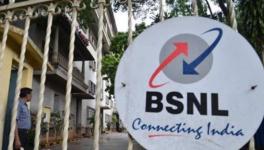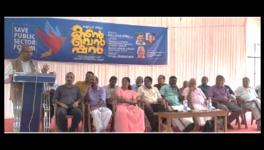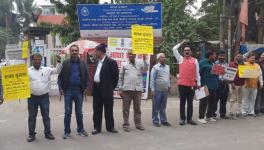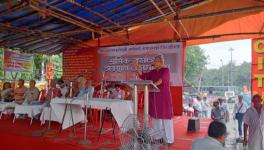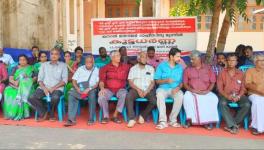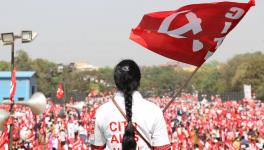BSNL Employees Unions Demand Restoration of All Abolished Jobs Post VRS
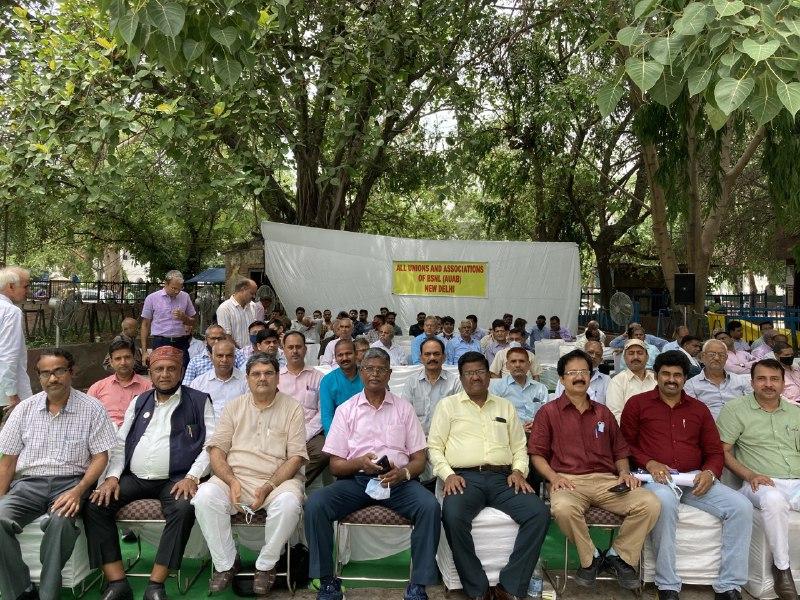
A demonstration was held at BSNL headquarters in New Delhi on Tuesday. Image clicked by Ronak Chhabra
New Delhi: Anguished over the restructuring of manpower that has led to “massive cut in vacancies” in Bharat Sanchar Nigam Limited (BSNL) and their long pending issues relating to pay scales, the executives and non-executives of the state-run telecom service provider staged a demonstration at its offices across the country on Tuesday.
Protesting at the call of All Unions and Associations of BSNL (AUAB), the employees flayed the BSNL management and the Department of Telecommunication (DoT) for not finding “timely solution” to their pending issues.
An improvement in the service conditions and career progression of BSNL’s executive and non-executive remains a “distant dream”, even as a rescue package for the debt-laden national telecom operator was announced by the Narendra Modi – led Central Government in 2019, union leaders told Newsclick on Tuesday.
According to them, the state-owned company is being “slowly killed from inside”, despite the government ministers and officials making public commitments about its revival.
A Rs. 69,000 crore package to turnaround the cash-strapped BSNL and MTNL (Mahanagar Telephone Nigam Limited) was announced in October 2019 which included rolling out 4G services, a voluntary retirement scheme (VRS), and monetisation of BSNL’s assets.
As a result, as many as 79,000 employees – over half of the total strength – of the BSNL’s workforce were retired in 2020. Subsequently, last year, in November, the BSNL board revised its sanctioned strength after the VRS and ordered abolition of all posts of executives and non-executives who had taken VRS.
“Post VRS, as over half of the workforce at BSNL was trimmed, many problems were faced by the existing staff in maintaining operations across the country. Despite this, the sanctioned posts were abolished,” P. Abhimanyu, convenor, AUAB told Newsclick on Tuesday, at the demonstration held at BSNL’s headquarters in New Delhi.
Abhimanyu said due to abolishment of the posts, when promotional exams are being held this year, there are “no vacancies” for the post of a Junior Telecom Officer (JTO) in 11 out of 28 circles across the country.
According to the notification dated November 23, 2011, issued by BSNL’s restructuring cell and accessed by Newsclick, the sanctioned strength of JTO and equivalent posts were brought down to 14,777 from 50,477.
“This is just one example. The same is the fate of other non-executives as well, for whom improvement in their service conditions and career progression remains a distant dream,” said Abhimanyu, adding that by not having enough posts due to “massive cuts in vacancies”, while the existing staff is “over-burdened” with work, the national telecom service provider is being “slowly killed from inside.”
Chandeshwar Singh, chairman, AUAB, told Newsclick that Tuesday’s protest was organised to also press for the immediate replacement of E1A pay scale with E2 pay scale and E2A pay scale with E3 pay scale for the executive staff members.
BSNL is a Central Public Sector Enterprise (CPSE) under DoT, in which pay revision is approved based on the recommendations of the Pay Revision Committee (PRC), administered by Department of Public Enterprises under Ministry of Heavy Industries and Public Enterprises.
According to AUAB, the 2nd PRC recommendation, in 2008, has recommended CPSEs to replace all the existing pay scales with the 10 standard pay scales, as defined by the Department of Public Enterprises from E0 to E9, thus clarifying that no non-standard pay scales should continue.
“BSNL was then having non-standard pay scale as E1A and E2A for posts equivalent to Junior Telecom Officers (JTOs) and Sub Divisional Engineers (SDEs), respectively,” Singh claimed, who added that these were not replaced by E2 and E3 pay scale, even as all other CPSEs made the switch.
“It has been many years since we have been demanding that the BSNL management and DoT should address the issue, but to no avail. After the announcement of rescue package in 2019, and the subsequent VRS scheme, we thought that since huge amounts of money in wage bills is being saved by BSNL, our issues relating to pay scale will also be addressed,” Singh said, adding “sadly that has not been the case.”
Meanwhile, protesting BSNL employees also flayed the management and the Centre for the delay in the rolling out 4G services and the monetisation of telecom assets. Under the National Monetisation Pipeline (NMP), the Centre plans to monetise 2.86 lakh km of optic fibre laid under the Bharat Net project as well as 14,917 mobile towers owned by BSNL.
Get the latest reports & analysis with people's perspective on Protests, movements & deep analytical videos, discussions of the current affairs in your Telegram app. Subscribe to NewsClick's Telegram channel & get Real-Time updates on stories, as they get published on our website.











